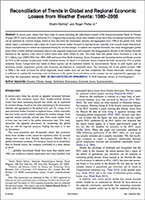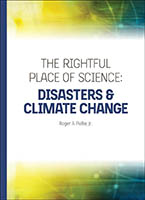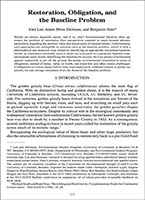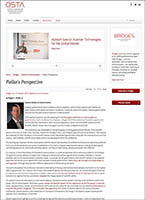|
Regional Environmental Change, August 18, 2014 Resource managers and governments at all scales are becoming more aware of the challenges and opportunities that climate change and variability pose for their operational goals. At the same time, providers of climate information are learning that simply creating and disseminating information without context does not necessarily serve the needs of decision makers. As a result, calls for new ways of supporting decision making and supplying information abound. Many of these calls suggest that much more consultation with stakeholders is necessary in order to effectively serve their needs and provide usable information. While this is undoubtedly true, there is also in many cases an existing wealth of experience understanding needs of stakeholders that could be assessed before additional interaction is warranted. The goal of this study was to produce a baseline of stakeholder needs with respect to climate-related decision making from existing documents in three interior western states in the USA to examine patterns of needs and avoid stakeholder fatigue. Read more ... |
Ecological Restoration, Vol. 32, No. 3, 2014 Elk overgrazing in Rocky Mountain National Park (RMNP), understood largely to be a consequence of wolf extirpation, poses not only a practical problem, but also several conceptual hurdles for park managers. The current RMNP ecosystem management plan addresses overgrazing by culling elk and fencing off riparian environments. This “functionalist” view effectively substitutes the role of wolves in the ecosystem with human intervention, and implicitly conflates the role or function of wolves with wolves themselves. In this paper, we argue that such substitution logic presents a conceptual problem for restoration. Seeking a resolution for this “substitution problem,” we distinguish between “reparative restoration” and “replacement restoration.” Where reparative restoration seeks to repair damage, replacement restoration seeks more aptly to replace the function of one ecological component with another. We suggest that in many cases reparative restoration is preferable to replacement restoration, and when characterized as such, may serve to better justify wolf reintroduction. Read more ... |
Bridges, Vol. 39, May 2014 With apologies to John Maynard Keynes, much of what occurs in discussions of science policy is in servitude to the ideas of some defunct scientist from quite a few years back. A fascinating workshop in Bonn, Germany, last month explored the deep historical currents that shape how we think today about the role of science in society. The concepts that we use in science policy reflect historical debates about class, economics, and politics that exert continuing influence on how we think about the role of publicly supported research in society. Here I will describe some of what stood out for me among the impressive array of historical research presented at the conference workshop. Read more ... |
Natural Hazards Review, February 2014 In recent years, claims have been made in venues including the authoritative reports of the Intergovernmental Panel on Climate Change (IPCC) and in testimony before the U.S. Congress that economic losses from weather events have been increasing beyond that which can be explained by societal change, based on loss data from the reinsurance industry and aggregated since 1980 at the global level. Such claims imply a contradiction with a large set of peer-reviewed studies focused on regional losses, typically over a much longer time period, which concludes that loss trends are explained entirely by societal change. To address this implied mismatch, this study disaggregates global losses from a widely utilized reinsurance data set into regional components and compares this disaggregation directly to the findings from the literature at the regional scale, most of which reach back much further in time. Read more ... |
Consortium for Science, Policy & Outcomes, November 2014 In recent years the media, politicians, and activists have popularized the notion that climate change has made disasters worse. But what does the science actually say? Roger Pielke, Jr. takes a close look at the work of the Intergovernmental Panel on Climate Change, the underlying scientific research, and the data to give you the latest science on disasters and climate change. What he finds may surprise you and raise questions about the role of science in political debates. More information. |
Environmental Ethics, Volume 36, Issue 2, Summer 2014 Should we restore degraded nature, and if so, why? Environmental theorists often approach the problem of restoration from perspectives couched in much broader debates, particularly regarding the intrinsic value and moral status of natural entities. Unfortunately, such approaches are susceptible to concerns such as the baseline problem, which is both a philosophical and technical issue related to identifying an appropriate restoration baseline. Insofar as restoration ostensibly aims to return an ecosystem to a particular baseline state, and depends upon clearly identifying this baseline for success, the very project of restoration appears impossible to get off the ground. Recasting environmental restoration in terms of obligations, instead of status, value, or worth, can avoid this and other classic challenges. If obligations to restore nature follow from intersubjectively validated reasons to justify our actions, we can salvage restoration from the threat of the baseline problem. Read more ... |
Slate Magazine, September 19, 2014 As the Ebola epidemic in West Africa has spiraled out of control, affecting thousands of Liberians, Sierra Leonians, and Guineans, and threatening thousands more, the world’s reaction has been glacially, lethally slow. Only in the past few weeks have heads of state begun to take serious notice. To date, the virus has killed more than 2,600 people. This is a comparatively small number when measured against much more established diseases such as malaria, HIV/AIDS, influenza, and so on, but several factors about this outbreak have some of the world’s top health professionals gravely concerned: Its kill rate: In this particular outbreak, a running tabulation suggests that 54 percent of the infected die, though adjusted numbers suggest that the rate is much higher. Its exponential growth: At this point, the number of people infected is doubling approximately every three weeks, leading some epidemiologists to project between 77,000 and 277,000 cases by the end of 2014. Read more ... |
Bridges, Vol. 41,October 2014 Globally, governments have incredible access to expertise. Some of these experts work directly for governments, while others are found in academia, in business, and in civil society. How can governments best tap into this wide array of expertise in making policy? This important question was the backdrop for the first global conference on science advice to governments, held in Auckland, New Zealand, in August 2014. The conference focused on government science advisory mechanisms, which includes (especially in some Commonwealth nations) a Chief Scientific Advisor whose role is to support a prime minister or departmental chief. Read more ... |










